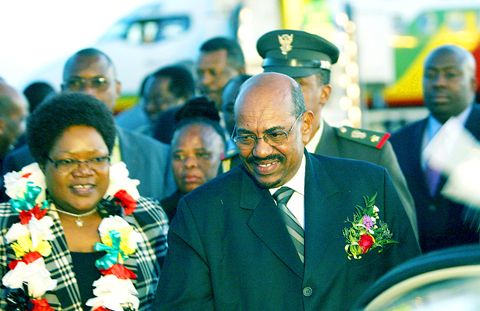Africa’s main trading bloc was to open a summit yesterday to launch a customs union that will stretch across the continent in a bid to boost regional trade.
Under the deal, the 19 countries in the Common Market for Eastern and Southern Africa (COMESA) will impose the same tariffs on goods from outside the region.
Raw materials and capital goods will travel across borders without tariffs, while intermediate products will be taxed at 10 percent and finished goods at 25 percent.

PHOTO: AFP
Most countries have also lifted visa restrictions on travel within the bloc, with members ranging from tourist hotspot Egypt to some of the world’s poorest and most conflict-torn nations, like the Democratic Republic of Congo.
The COMESA region is home to 400 million people, with a combined GDP of US$360 billion.
Leaders hope the union will simplify trade across the region and provide the basis for strengthening integration in the future, eventually leading to a single currency.
“The customs union will therefore enable us to grow beyond the free movement of goods and establish the foundations of a single market,” Zimbabwean Prime Minister Morgan Tsvangirai told business leaders ahead of the summit in the resort town of Victoria Falls.
“It will offer a more predictable economic environment for both investors and traders across the COMESA region,” he said.
The launch of the union had been set for May last year, but was twice delayed because of Zimbabwe’s political turmoil and to allow more time for the 19 member countries to negotiate the harmonization of tariffs.
Officials say COMESA has already succeeded in increasing trade within Africa, which historically has exported most of its raw materials to rich countries with little commerce within the continent.
Kenyan Trade Minister Amos Kimunya said trade within the bloc had increased fivefold over the past decade, from US$3 billion to US$15 billion.
“The COMESA market is now the No. 1 export market for several members states, ahead of traditional export markets such as the European Union,” Kimunya said.
But some economists doubt that the customs will change Africa’s traditional trade patterns.
“African states don’t trade among themselves,” said Bongani Motsa, an economist at the Pan African Advisory Service financial consultancy. “If you look at the trading account, African states trade in primary products which they mostly export to the European Union, and then they import high value products from other international countries.”
COMESA comprises Burundi, Comoros, Djibouti, the Democratic Republic of Congo, Egypt, Eritrea, Ethiopia, Kenya, Libya, Madagascar, Malawi, Mauritius, Rwanda, Seychelles, Sudan, Swaziland, Uganda, Zambia and Zimbabwe.

WAITING GAME: The US has so far only offered a ‘best rate tariff,’ which officials assume is about 15 percent, the same as Japan, a person familiar with the matter said Taiwan and the US have completed “technical consultations” regarding tariffs and a finalized rate is expected to be released soon, Executive Yuan spokeswoman Michelle Lee (李慧芝) told a news conference yesterday, as a 90-day pause on US President Donald Trump’s “reciprocal” tariffs is set to expire today. The two countries have reached a “certain degree of consensus” on issues such as tariffs, nontariff trade barriers, trade facilitation, supply chain resilience and economic security, Lee said. They also discussed opportunities for cooperation, investment and procurement, she said. A joint statement is still being negotiated and would be released once the US government has made

Authorities have detained three former Taiwan Semiconductor Manufacturing Co (TMSC, 台積電) employees on suspicion of compromising classified technology used in making 2-nanometer chips, the Taiwan High Prosecutors’ Office said yesterday. Prosecutors are holding a former TSMC engineer surnamed Chen (陳) and two recently sacked TSMC engineers, including one person surnamed Wu (吳) in detention with restricted communication, following an investigation launched on July 25, a statement said. The announcement came a day after Nikkei Asia reported on the technology theft in an exclusive story, saying TSMC had fired two workers for contravening data rules on advanced chipmaking technology. Two-nanometer wafers are the most

NEW GEAR: On top of the new Tien Kung IV air defense missiles, the military is expected to place orders for a new combat vehicle next year for delivery in 2028 Mass production of Tien Kung IV (Sky Bow IV) missiles is expected to start next year, with plans to order 122 pods, the Ministry of National Defense’s (MND) latest list of regulated military material showed. The document said that the armed forces would obtain 46 pods of the air defense missiles next year and 76 pods the year after that. The Tien Kung IV is designed to intercept cruise missiles and ballistic missiles to an altitude of 70km, compared with the 60km maximum altitude achieved by the Missile Segment Enhancement variant of PAC-3 systems. A defense source said yesterday that the number of

Taiwanese exports to the US are to be subject to a 20 percent tariff starting on Thursday next week, according to an executive order signed by US President Donald Trump yesterday. The 20 percent levy was the same as the tariffs imposed on Vietnam, Sri Lanka and Bangladesh by Trump. It was higher than the tariffs imposed on Japan, South Korea and the EU (15 percent), as well as those on the Philippines (19 percent). A Taiwan official with knowledge of the matter said it is a "phased" tariff rate, and negotiations would continue. "Once negotiations conclude, Taiwan will obtain a better